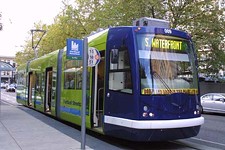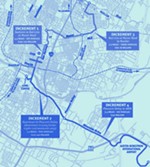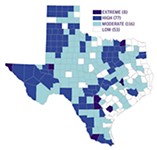Streetcar Blow-Up
Splitting rails over the latest transit plan
By Katherine Gregor, Fri., May 2, 2008
ROMA was still several weeks away from a final report, now expected in mid-May. The consultants' work will inform a city of Austin project proposal for urban rail. That proposal will, in turn, be submitted to a detailed, analytical transportation investment decision-making process, to be finalized next week by the Transit Working Group of the Capital Area Metropolitan Planning Organization.
The Statesman story got numerous facts wrong and made it sound as though a specific ROMA rail proposal was a done deal. Those unhappy with this messaging failure point the finger at Council Member Brewster McCracken, who left the station early and went public, championing a half-baked plan that still lacked a clear scope and hard cost and financing data. That earned him the ire of some colleagues, transit advocates, and fellow Transit Working Group members, who saw McCracken as seizing the limelight and co-opting the process, inspired by mayoral ambitions.
Principal Jim Adams said ROMA and its subconsultant, LTK Engineering Services, are still evaluating the various available technologies. (No, it hasn't been decided whether to use light rail or ultralight rail.) They also are assessing the benefits of a shared-lane (true streetcar) system vs. dedicated transit lanes. ROMA's assigned scope of work was to evaluate only links between Downtown and three key destinations – the airport, Mueller, and the Long Center/Zilker Park. As urban designers, ROMA will address improved connectivity with planned and future regional commuter rail service and improving overall mobility – pedestrian, bicycle, and vehicular. LTK has planned streetcar systems for Portland, Ore.; Seattle; and many other cities.
Mayor Will Wynn originally led the streetcar initiative, calling for a voter rail referendum in November. But when Wynn agreed to submit the city of Austin's transit initiative to a CAMPO evaluation process, he essentially handed over the political reins to CAMPO and Chair Kirk Watson. While there's no legal requirement that the city get CAMPO's blessing, it is widely seen as in the best interests of regional transportation planning.
The underlying purpose of the Transit Working Group process, crafted since January, is to transform regional conversations. In place of position-based fights (transit lovers vs. road warriors), Watson has been advocating for a new process of data-based, rational decisions.
As a result of the flap, the city has postponed ROMA's next scheduled presentations. New dates for council and Transit Working Group presentations have not been set.
Got something to say on the subject? Send a letter to the editor.










